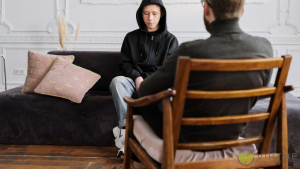Key Takeaways
-
LSD use can cause flashbacks—sudden, brief returns of hallucinogenic experiences long after the drug has worn off.
-
In some cases, a person may develop HPPD (Hallucinogen Persisting Perception Disorder), a condition with lasting visual disturbances.
-
HPPD can cause trails, halos, and static-like vision, interfering with everyday life and causing anxiety or panic.
-
Risk factors include frequent LSD use, mental health history, and use of other substances like cannabis.
-
Virtue Recovery Houston offers treatment and support for individuals struggling with HPPD or other effects of hallucinogen use.
Introduction
LSD, also known as lysergic acid diethylamide, is a hallucinogenic drug that changes how people think, feel, and see the world. Some people take it for its intense and colorful trips. But for others, the effects don’t stay in the past. They return—sometimes suddenly, and without warning.
These unexpected moments are called flashbacks. And in some cases, they happen more often, last longer, and start to disrupt daily life. This condition is known as Hallucinogen Persisting Perception Disorder, or HPPD.
If you or someone you care about is dealing with flashbacks, strange visual experiences, or anxiety after taking LSD, this article will help you understand what’s happening and how to get support.
What Is an LSD Flashback?
An LSD flashback is when parts of a past LSD experience come back after the drug has worn off. It can happen days, weeks, or even months later. The flashback might be mild, like seeing bright colors or moving patterns. Or it could be more intense, feeling like part of the original “trip” is happening again.
Most flashbacks don’t last long—just a few seconds or minutes. They can show up when someone is tired, stressed, or using other substances like cannabis or alcohol. But sometimes, they happen out of the blue, even when someone is healthy and sober.
For many, these flashbacks fade with time. But for some, they continue or grow worse. That’s when HPPD may be involved.
What Is Hallucinogen Persisting Perception Disorder (HPPD)?
HPPD is a condition where a person experiences ongoing visual disturbances after using LSD or another hallucinogen. These effects can make it feel like the drug is still active, even though it isn’t.
Common HPPD symptoms include:
-
Seeing trails or afterimages when something moves
-
Flashes of light or bright spots in the vision
-
Halos or glowing edges around objects
-
Blurry or distorted vision
-
Visual “snow,” like static on a TV screen
Some people also feel confused, anxious, or panicked when these visual effects appear. The condition doesn’t mean the person is still using LSD. In fact, most cases happen after someone has already stopped using the drug.
There are two types of HPPD:
-
Type 1: Occasional flashbacks that come and go
-
Type 2: Persistent visual effects that last for months or years
What Causes LSD Flashbacks and HPPD?
LSD affects a brain chemical called serotonin, which helps control mood, vision, and thinking. When LSD changes how serotonin works, it can also change how the brain processes images and light.
Most people return to normal vision after a trip. But for some, these changes last longer. This may be because of:
-
Frequent LSD use or large doses
-
Using other hallucinogens like psilocybin (magic mushrooms) or MDMA
-
A history of mental health conditions such as anxiety, panic attacks, or schizophrenia
-
Using other substances like marijuana, which can make symptoms worse
Scientists don’t fully understand why some people develop HPPD while others don’t. But it’s clear that certain factors—like stress or substance use—can trigger or worsen symptoms.
How Does HPPD Affect Mental Health?
Living with HPPD can be scary and confusing. People may see things that aren’t there or feel like they’re stuck in a dream. This can make it hard to trust their own senses, which leads to anxiety or panic.
Some people stop going out in public or avoid driving because the visual distortions are too distracting. Others become afraid they’re developing a serious mental illness or losing control of their minds.
Over time, HPPD can cause:
-
Panic attacks
-
Depression or mood swings
-
Trouble sleeping or focusing
-
Fear of social situations
-
Worsening of substance use or relapse
Because HPPD feels so strange and personal, many people don’t talk about it. But the symptoms are real—and treatable.
Treatment Options for HPPD and LSD Flashbacks
There’s no one-size-fits-all cure for HPPD, but there are ways to manage symptoms and improve quality of life.
1. Therapy and Counseling
Talking with a therapist who understands substance use and mental health can help reduce anxiety, teach coping skills, and improve daily functioning.
2. Medication (When Appropriate)
Doctors sometimes prescribe medications like benzodiazepines to help with panic symptoms. Other options may include certain antidepressants, but these must be chosen carefully to avoid making symptoms worse.
3. Avoiding Triggers
Flashbacks and HPPD symptoms often get worse with marijuana, alcohol, caffeine, or lack of sleep. Staying away from these triggers can help reduce symptoms.
4. Stress Management
Practices like meditation, yoga, and deep breathing can calm the nervous system and make symptoms feel less overwhelming.
5. Supportive Addiction Treatment
At Virtue Recovery Houston, treatment plans include therapy for past drug use and support for ongoing symptoms like HPPD. Programs are tailored to meet each person’s needs.
Why Treatment Matters
LSD flashbacks and HPPD don’t have to take over your life. While the symptoms can be unsettling or scary, they are treatable. And you are not alone.
Many people live full, healthy lives after developing flashbacks or HPPD. But the key is getting the right support—early, and from professionals who understand what you’re going through.
Whether you’re dealing with visual disturbances, anxiety, or fear from past LSD use, there’s hope. Treatment can help you find clarity and peace of mind again.
Conclusion: Support for HPPD and Flashback Symptoms Is Here
LSD may leave the body quickly, but for some, its effects linger in the mind. If you’ve experienced flashbacks or lasting changes in how you see the world, you might be facing HPPD.
It’s not your fault, and you’re not imagining things. Help is available.
Call Virtue Recovery Houston at 713-234-6254 today to speak with someone who understands. Our team is here to help you manage symptoms, understand what’s happening, and build a recovery plan that works for you.
How Does Addiction Recovery Help Address LSD Flashbacks and HPPD?
Navigating recovery from lsd addiction involves understanding and managing lingering effects like LSD flashbacks and Hallucinogen Persisting Perception Disorder (HPPD). By engaging in therapy and support groups, individuals can develop coping strategies, reduce anxiety, and gain tools to address these symptoms, fostering a more stable and fulfilling life post-addiction.








